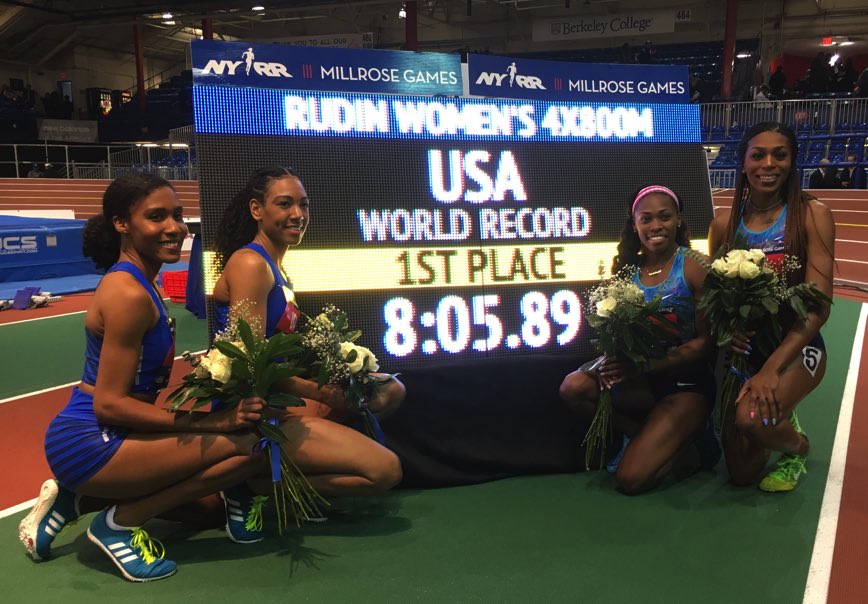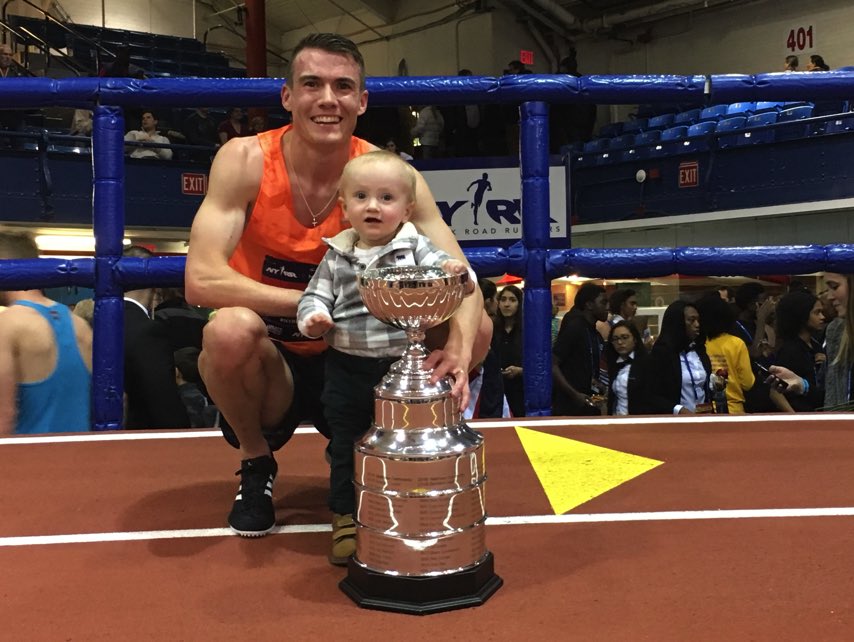By Rich Sands, @sands
(c) 2018 Race Results Weekly, all rights reserved
NEW YORK (03-Feb) — On an afternoon that included a world record and a world best, it was Chris O’Hare who put an exclamation point on the 111th NYRR Millrose Games here, holding on for a thrilling win in the meet’s signature and final event, the NYRR Wanamaker Mile. The Scottish star used a gutsy tactic to force the pace and had just enough left to score his first win in the historic race. That followed all-time bests in two rarely-run events, with Shaunae Miller-Uibo of the Bahamas matching the 300 meter world best mark, while an all-star team of Americans squeaked under the 4×800-meter relay world record at the New Balance Track & Field Center at the Armory in upper Manhattan.

But the NYRR Millrose Games is best known for its closing event and O’Hare dazzled the crowd of approximately 5,500 to join the fraternity of Wanamaker champions. Making his 2018 season debut, the 27-year-old from Edinburgh had advocated for a fast opening tempo. He was pleased with the pacesetting of Riley Masters, who took the field through the opening quarter mile in 58.1 and the halfway point in 1:55.8. Masters pulled aside on the next lap, and O’Hare moved to the front, determined to keep the heat on. He passed three-quarters of a mile in 2:54.6, a full two seconds ahead of the pack.
The last two laps were arduous for O’Hare, and the field sensed an opening. Ben Blankenship of the Nike Oregon Track Club threw in a surge and started to close the gap, but was ultimately unable to catch the leader, who finished in 3:54.14, the second-fastest time in the world during this young indoor season. The University of New Mexico’s Josh Kerr, the reigning NCAA indoor mile champion and another Scot, joined the chase and passed Blankenship at the line for second, 3:54.72 to 3:54.77.

“I just wanted to make it hard—for myself and everyone else,” said O’Hare, who recently moved from Boston to Oklahoma, where he attended college at the University of Tulsa and where he met his wife, Meredith. “I wanted to test what we’ve done [in training], but also test everybody else and where they were at.”
It was a courageous strategy for his first race of the year and he wasn’t sure it would pay off until he crossed the line. “I was looking up at the screen and I could see where they were coming from,” he said after the race, while battling his 2-year-old son, Ronan, for control of a bottle of water. “Every time I looked up they were a bit closer, but I just tried to stay smooth. I tightened up a lot on the last lap, but that’s what happens when you put in such a big effort with 600-700 meters to go.”
The crowd was already hyped up from the previous event, the women’s 4×800, which saw the foursome of Chrishuna Williams (2:05.10), Raevyn Rogers (2:00.45), Charlene Lipsey (2:01.98) and Ajee’ Wilson (1:58.37) slip under the world record. Their time of 8:05.89 improved on the 8:06.24 set by a Russian squad in 2011.
“That is the loudest I’ve ever heard it here,” said Wilson, who won bronze in the 800 at last summer’s IAAF World Championships. “Every lap was high energy, it wasn’t just for the last 100. It was powerful during my entire leg. The crowd definitely helped push me.”
Earlier in the meet Miller-Uibo, the 2016 Olympic champion in the 400 and a dominant 200 runner as well, split the distance and equaled the world best in the 300. (The IAAF does not recognized the event for official world record status.) She clocked 35.45. duplicating the time of Russian Irina Privalova, set way back in 1993.
Statistically speaking, the meet’s most impressive mark was the 1:44.21 of Emmanuel Korir in the men’s 800. The Kenyan won NCAA indoor and outdoor titles in the event last year as a freshman at the University of Texas-El Paso, but has since turned professional. He’s now the third fastest man ever indoors. Behind him, Donavan Brazier (1:45.35) and Drew Windle (1:45.53) moved to the No. 2 and 3 slots on the U.S. all-time indoor list, and locked-in qualifying times for the upcoming IAAF World Indoor Championships in March.
The women’s 3000 meters turned into one of the day’s most competitive races, with an excellent depth of results. Jamaican Aisha Praught-Leer took the win in 8:41.10, just six-hundredths of a second ahead of training partner Emma Coburn. With many of the athletes eyeing the 8:50 qualifying time for the IAAF World Indoor Championships, there was no shortage of challengers up front. Karissa Schweitzer, a senior at the University of Missouri, took the lead with 800 meters to go, hoping to pull off an upset. Praught-Leer and Coburn responded quickly and staged a spirited duel. Coburn, the reigning world champion in the 3000-meter steeplechase, tried to take the lead at the bell, but Praught-Leer fought her off, setting a Jamaican record, while Coburn moved up to the No. 4 slot on the U.S. all-time indoor list.
“I don’t think a lot during races, so when I saw that blond hair that I’m really familiar with, I just thought, ‘let’s go,'” Praught-Leer said of Coburn’s challenge. “It’s fun and [we] have a great competitive nature between the two of us, but because we love each other so much we push each other. I’m so happy we both ran fast.”
Closing fast at the end was Dominique Scott-Efurd of South Africa, who edged past Schweizer for third, clocking a national indoor record of 8:41.18. Schweizer’s consolation prize in fourth palace was a collegiate record 8:41.60. That surpassed the 8:42.03 run by Colorado’s Jenny Barringer (now Simpson) in 2009.
“Going into this my coach never said I should try winning it, he just told me to stay relaxed and be competitive,” said Schweizer, who swept NCAA titles in cross country and the indoor and outdoor 5000 as a junior. “So for me to be competitive in a race means to take any chance I get. I got passed at the end, but that doesn’t take away from this awesome experience. To race with some of those girls is incredible in itself.”
Other impressive winners included Colleen Quigley in the women’s Wanamaker mile (4:30.05, just three-hundredths of a second ahead of Nike Bowerman Track Club training mate Kate Grace). Both women were running their first races of the year, and were the last women to enter the event. Shadrack Kipchirchir won a very competitive men’s 3000 in 7:45.49. He held off Syracuse University’s Justyn Knight who ran a personal best 7:45.86. In the men’s race, all 11 finishers broke the IAAF World Indoor Championships qualifying standard of 7:53.00.
Sophomore sensation Katelyn Tuohy of Thiells, N.Y., was upset in the girls high school mile. Leading most the the race, she faded badly in the final quarter and would only finish fourth. The win went to Gabrielle Wilkinson of Wynnewood, Pa., in a personal best 4:42.94.


